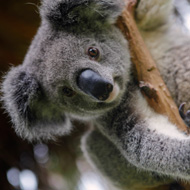Koalas learn to use safe passages

Researchers wanted to find out if specific koala tunnels, ledges and passages could help the animals to cross the road more safely.
Koala bears in south-east Queensland, Australia, appear to be using ledges and tunnels created to help them cross roads safely, according to research by Griffith University.
Increasing urbanisation in the region is thought to be the main reason for declining koala populations, as their habitats are cleared for development. Queensland koalas are now among Australia's most at risk species, and were listed as 'vulnerable' in 2012. Vehicle collisions have been identified as a key threat to the species.
Researchers wanted to find out if specific koala tunnels, ledges and passages could help the animals to cross the road more safely. Previous studies in New South Wales have shown that koalas are capable of using these types of structures, but the team from Griffiths University say this is the first time a range of technologies have been used to track individual koalas.
Existing structures such as water culverts and bridge underpasses were retrofitted with the aim of allowing animals a safe passage under roads. Researchers were surprised to find the koalas learned how to use them more quickly than expected.
Professor Daryl Jones commented: "We expected the animals to take a while to get used to them. To our great surprise they were using them three weeks into it. Can you teach koalas new tricks? You can, that's the point."
Working at six sites in south-east Queensland, researchers observed 130 road crossings involving a retrofitted structure or road surface over a 30 month period. They used a variety of tools to track the koalas, including camera traps, audio radio transmitters, sand plots, GPS collars, RFID tags (which are similar to a microchip) and wireless ID tags.
Findings published by CSIRO suggest that road crossings in general are uncommon, with a relatively small subset of individuals (21 per cent).
The research team say studies should move away from assessing how many species pass through the passages, to which individuals are utilising the structures. This type of information will allow 'a powerful step forward in providing road authorities with recommendations in relation to the design and placement of crossing structures, and ensuring that the costs equal the ecological benefit.'



 The Veterinary Medicines Directorate (VMD) is inviting applications from veterinary students to attend a one-week extramural studies (EMS) placement in July 2026.
The Veterinary Medicines Directorate (VMD) is inviting applications from veterinary students to attend a one-week extramural studies (EMS) placement in July 2026.